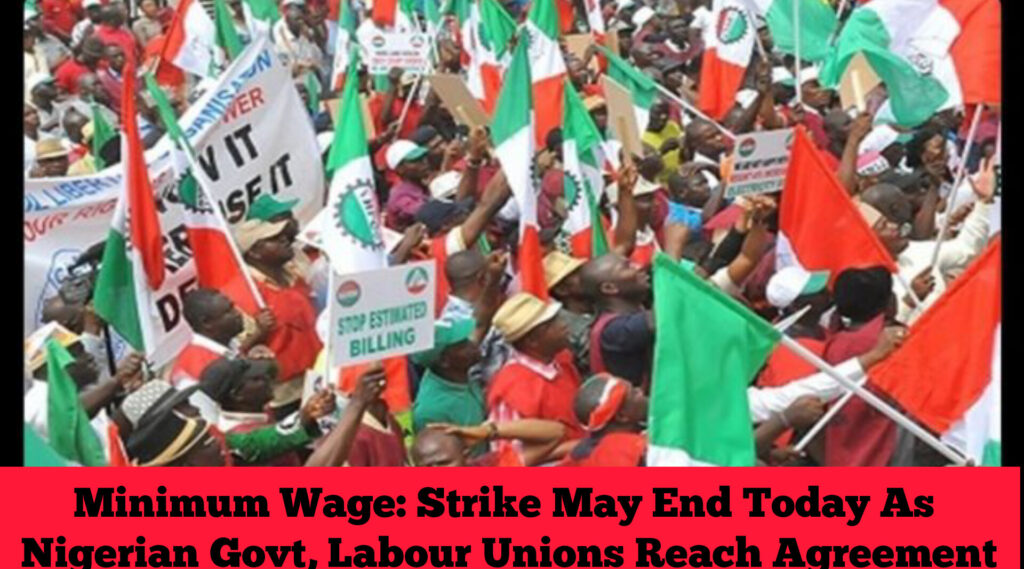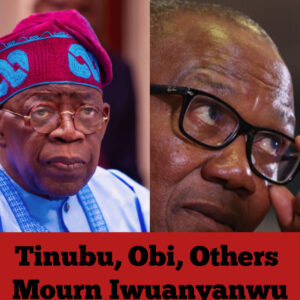
There are indications that the organized Labour may end its strike over the new minimum wage as it reached an agreement with the Federal Government on Monday.
After a six-hour meeting in Abuja, the Federal Government expressed the commitment of President Bola Tinubu to raising the N60,000 offered as the minimum wage.
The meeting, held in the office of the Secretary to the Government of the Federation, on Monday evening aimed to resolve the impasse and bring an end to the industrial action that had paralysed various sectors across the country.
After extensive deliberations, several key resolutions were reached.
The agreement stated that “ the President of Nigeria, Commander-in-Chief of the Armed Forces, is committed to establishing a National Minimum Wage higher than N60,000; and the Tripartite Committee will convene daily for the next week to finalize an agreeable National Minimum Wage.”
The organised labour also agreed to “immediately hold meetings of its organs to consider this new offer, and no worker would face victimisation as a consequence of participating in the industrial action.”
These resolutions were signed on behalf of the Federal Government by Minister of Information and National Orientation, Mohammed Idris, and Minister of State for Labour and Employment, Hon. Nkeiruka Onyejeocha.
Representing the organised labour were the President of the Nigeria Labour Congress, Joe Ajaero, and the President of the Trade Union Congress, Festus Osifo.
Meanwhile, the Federal Government will on Tuesday (today) resume talks with organised Labour in a move to resuscitate the stalled minimum wage negotiation.
The meeting will be held amidst the nationwide strike which grounded the states and the Federal Capital Territory, Abuja, on Monday.
The invitation to the meeting on Monday was signed by the Secretary of the Tripartite Committee on National Minimum Wage, Ekpo Nta.
The invite addressed to the labour leaders read, “I respectfully invite you to attend the 8th meeting of the Tripartite Committee on National Minimum Wage scheduled as follows: Date: Tuesday, June 4, 2024; Venue: Nicon Luxury Hotel, Area 11, Abuja; Time: 10am prompt.
“The minutes of the 7th meeting, the draft agenda for the 8th meeting and the Zoom link for virtual attendance will be forwarded to you in due course. Regards.’’
Worried by the crippling impact of the strike, the Minister of Information and National Orientation, Mohammed Idris, again, on Monday, called for more minimum wage negotiations.
In what he called “a very passionate, heartfelt and deeply considered appeal” to organised labour, the information minister said the cost of the proposed minimum wage would total N9.5tn annually for the Federal Government.
He said, “As we had explained earlier, Labour’s current proposal of N494,000 is an increase of 1,547 per cent on the existing wage and translates into an annual wage bill of N9.5trn for the Federal Government of Nigeria.’’
The minister called the labour unions to return to the negotiation table and promised that the Federal Government would be available to further the discussions.
Idris stated, “Yesterday (Sunday), the leadership of the National Assembly met with the unions. Today, we have offered yet another invitation to the unions to meet with us and continue our discussions.
FG invites Labour
“We will continue to engage and continue to make ourselves available in the context of these negotiations on behalf of the Nigerian people.”
Speaking on the strike, the Labour Party in Nigeria called on the unions to re-negotiate with the government on a new minimum wage rather than embarking on an industrial action.
The National Publicity Secretary of the Labour Party, Obiora Ifoh, in an interview with the News Agency of Nigeria, declared that labour’s demand for N494,000 minimum wage was unrealistic.
Ifoh said that the strike was not an option, noting that it would cause more hardship and suffering.
He stated, “Our immediate reaction is that organised labour should not throw Nigerians into more hardship.
“Nigerians are already grappling with a lot of challenges and we do not need to exacerbate the situation. I think the demand for N494,000 minimum wage is unrealistic. It is really unrealistic.
“It is a figure that cannot be sustained because it will imply that Nigeria will take all that money it has to pay the civil servants.”
Meanwhile, there was a high level of compliance with the industrial action declared by the leadership of the Nigeria Labour Congress and the Trade Union Congress across the country.
The strike was directed by the leadership of the labour movement following the failure of the tripartite committee to reach a consensus on a new minimum wage paralysed economic and commercial activities as airports, banks, schools, public offices and hospitals were locked down by workers.
Organised Labour declared an indefinite nationwide strike on Friday due to the Federal Government’s refusal to increase its new minimum wage offer above N60,000.
The President of the NLC, Joe Ajaero, announced that the strike followed failed negotiations between the government and organised labour, and its refusal to reverse the withdrawal of the power sector subsidy and increase in electricity tariff.
The unions had earlier given May 31, 2024 deadline for the conclusion of new minimum wage negotiations.
The government had raised its minimum wage offer from N57,000 to N60,000 while the labour unions reduced their demand to N494,000 from N497,000 proposed earlier. The labour leaders initially demanded N615,000.
Strike grounds states
Across Osun, Ogun, Lagos, Niger, Sokoto, Kano and other states, the strike was effective with schools, banks, government offices and public utilities locked down.
In Osogbo, Osun State, the power station and Osun Government Secretariat were shut.
A high number of security operatives were deployed to the Government Secretariat and Osogbo Regional Transmission Company as the facility was under lock and key.
Speaking to journalists at the gate, Mr. Musibau Okunloye, Chairman, Lagos Generation and Transmission Council, urged the Federal Government to reverse the recent hike in electricity tariff and do more in catering for the well of workers in the country.
He said, “Well, my appeal to the Federal government is just the same as what the Nigeria Labour Congress and TUC have said. They should listen to Labour. Labour is a force to be reckoned with.’’
There were no activities at the Specialist Hospital, Asubiaro.
Public schools were also shut while pupils who went to school were sent back, while academic activities went on uninterrupted in private schools.
Some banks located along Osogbo/Gbongan road did not open for business, while a few others received customers.
Official activities were also paralyzed at Ondo State and local government secretariats on Monday.
Similarly, all public schools, including the University of Medical Sciences Teaching Hospital, Akure, did not function.
The NLC Chairman in the state, Victor Amoko, said there was complete compliance with the strike, noting that the public and private sectors effectively shut down.
Amoko stated, “We have made a good start. If you go out there, you will find that the majority of our public and private offices are closed, and there is no work. Our construction chairmen are here to provide us with updates.”
In the same vein, the state TUC chairman, Clement Fatuwase, explained that the level of compliance in both public and private sectors in the state was encouraging, urging members to unite in the fight for the betterment of workers.
“The message is, let’s fight this once and for all and win it once and for all. Although we met with the Ondo state government yesterday (Sunday) and had extensive discussions about the strike, we granted them an exemption to ensure the completion of the WAEC and INEC officials’ work,” he explained.
The situation was the same in Sokoto as many banks, public schools and offices complied with the strike order.
Students of the Federal Government College were turned back by their teachers.
The NLC Secretary in the state, Hamisu Hussaini, said the labour leaders went round to ensure full compliance with the strike action.
At the Usmanu Danfodiyo University Teaching Hospital, there was partial compliance as a few doctors were on hand to attend to patients.
The Chairman, Academic Staff Union of Universities, Usmanu Danfodiyo University, Sokoto, Prof Muhammad Almustapha, said the union would join the strike.
He said, “I want to assure you that we are joining the strike, we just received the letter from the national headquarters and we are having our congress any movement from now.
“All I can tell you is that as a bonafide member of the NLC, we are joining the strike action immediately after the congress, which is our tradition.”
Similarly, Niger State was grounded by the strike as the labour leaders in the state enforced the shutdown of the state and federal secretariats, schools, hospitals, Abuja Electricity Distribution Company offices and banks.
The banks also closed their offices and turned back customers who came to transact business.
The Chairman, TUC, Ogun State, Akeem Lasisi, described the strike as very successful, saying that the compliance has been total and quite encouraging.
Lasisi said, “The level of compliance as far as the strike is concerned is total. The schools, hospitals, local government secretariats, the state and even federal secretariats are shut down.
“We only allow some schools to open because of the students writing the West African Senior Secondary Certificate Examination, so the strike in Ogun State has been quite successful.
“We, however, sincerely hope that the Federal Government will be reasonable enough to dialogue with workers to get this challenge resolved once and for all in favour of the workers. The truth is that the suffering is much and the government needs to respond positively to our modest requests”.
Rivers schools
In Port Harcourt, the Rivers State capital, banks, courts and schools did not open to the public.
All the banks along the stretch of Ikwerre Road, Aba Road, Trans-Amadi and Olu Obasanjo Road were shut.
Some customers attempted to use the Automated Teller Machines along the Trans-Amadi and Olu-Obasanjo Roads, but many were not dispensing cash.
Also, students of the Government Secondary School, Borikiri and Community Secondary School, both in Port Harcourt, were asked by the school authorities to go back home.
Workers did not show up at the Rivers State Judiciary Complex, Azikiwe Road and the Customary Court Complex.
But members of the Judiciary Staff Union of Nigeria were observed lounging under a tent in front of the judiciary complex.
Speaking to our correspondent, the State Secretary of JUSUN, Rosemary Mbata, said, “This place was shut as early as 6:30am today. It is because of the failure of the Federal Government and labour to agree on a new minimum wage.
“There will be no access until we are heard and a reasonable new minimum wage is agreed upon.
“We know every matter that comes to the court here is important and pressing but they too should understand with us that we are on strike. It’s nationwide, not just in Rivers State. So, the Federal Government should listen to us and do the needful. “
The state Chairman of the NLC, Alex Agwanwor, in an interview, expressed happiness that compliance with the strike was total.
Agwanwor further said a monitoring team went around to ensure compliance, adding that the Port Harcourt Refining Company and other companies were also shut.
He stated, “There is 100 per cent compliance and we are monitoring too. Our monitoring team is on the ground to ensure that workers comply.
The JUAC President, Rifkatu Iortyer, stated that the union was enforcing the strike action, as an affiliate body of the NLC and the TUC.
She urged the FCTA workers to stay at home, describing the FG-Labour impasse over the minimum wage as a long-term struggle.
“It’s been a long-term struggle concerning the national minimum wage issue. Now the hike in electricity tariff has joined.
‘’Till now, they have not reached a compromise on what to pay the least staff as the minimum wage, and since the national body of the two labour unions have declared it; FCT is part of it. We are an affiliate body of the national unions. We have to join the strike,’’ she said.
To demonstrate their level of seriousness, the electricity workers shut down the national grid, triggering a national blackout.
The Transmission Company of Nigeria in a statement, signed by its General Manager, Ndidi Mbah, disclosed that the grid shutdown occurred at about 2.19 am on Monday.
She said workers at the Benin Transmission Operator were sent away from the control room and beaten by some unidentified protesters.
“At about 1:15 am this morning, the Benin Transmission Operator under the Independent System Operations unit of TCN reported that all operators were driven away from the control room and that staff that resisted were beaten while some were wounded in the course of forcing them out of the control room and without any form of control or supervision, the Benin Area Control Center was brought to zero,” the statement read.
Other transmission substations that were shut down by the labour union include the Ganmo, Benin, Ayede, Olorunsogo, Akangba and Osogbo Transmission Substations.
The statement noted, “Some transmission lines were equally opened due to the ongoing activities of the labour union. On the power generating side, power generating units from different generating stations were forced to shut down some units of their generating plants.
‘’The Jebba Generating Station was forced to shut down one of its generating units while three others in the same substation subsequently shut down on very high frequency.
“The sudden forced load cuts led to high frequency and system instability, which eventually shut down the national grid at 2:19am.”
The TCN, however, said grid recovery commenced at about 3:23 am, using the Shiroro substation to attempt to feed the transmission lines supplying bulk electricity to the Katampe transmission substation.
“The situation is such that the labour union is still obstructing grid recovery nationwide,” the firm said.
The transmission company promised to make an effort to recover and stabilise the grid to enable the restoration of normal bulk transmission of electricity to distribution load centres nationwide.
punchng.com




